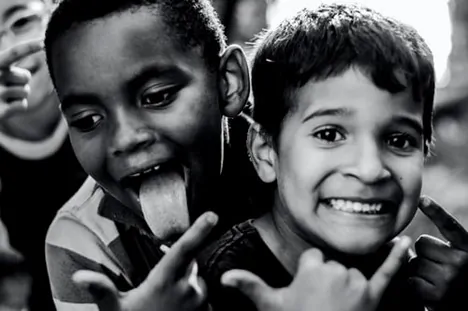
Picture by João Rafael on Unpslash
The only rule is it begins
Happy happy oh my friend
From the song ‘Backward Down the Number Line’
By Phish
When did I become emotionally guarded? How did I lose track that I even was? When is the last time I gave into feeling like the boys pictured here? Around whom do I let down my defenses? In what situations?
Most critically, what does my lack of joy cost me and others? It turns out a great deal. We need to remember.
Contrasting Stories:
I recall vacationing at the Jersey shore and making a ‘best friend’ for the week. The connection seemed effortless and proved to be the source of tremendous happiness. We quickly became absorbed in our world for the week. When faced with adversity, such as heavy rain, we did not wonder what we could do; instead, we problem-solved and reinvented what we did on the fly. My recollection informs me these interactions lasted through second grade, after which they seemed to have vanished, along with my capacity to replicate them.
How quickly they can turn. A friend recently related a story of being smashed unintentionally in the forehead with a bat during a baseball game. At age nine, he already ‘knew’ he was not to cry, asking the doctor for a mirror so he could witness him stitch his wound, all 28 of them.
What do these stories have in common? The first recalls a childhood memory of relishing the excitement of a newfound relationship, and the other is about suppressing ‘unacceptable’ emotions. They expose different ways we handle vulnerability and access our feelings – one natural and the other learned. As such, they have everything in common.
Why it matters:
The severity of the belief system instilled in the man as a young boy was troubling to hear. I also recognize pieces of it in me. Each of us learns to resist experiencing painful feelings to a degree. However, learning particular sets of emotions are off-limits causes the most severe and enduring damage.
Feelings of pain and pleasure are linked to one another. When we block out painful emotions, we simultaneously eliminate pleasurable ones. Unwittingly, we constrict our emotional range. Doing so closes us off from ourselves and others and reduces our capacity to connect and lead.
Brené Brown’s research revealed joy to be the feeling people find most threatening. Consequently, instead of courageously upping our vulnerability, we armor ourselves for emotional protection, signaling the world is unsafe. Tragically, our ‘acquired’ fear of foreboding emotions provokes us to suppress them and keeps us from remembering our innate access to the superpower of joy.
Consider the boys playing at the beach and their high emotional functioning. Experiencing delight, they exhibit high energy and intense focus. Aware of themselves, they apply emotional intelligence. They limit the stultifying effects of judgment and instead channel their power of imagination and curiosity. They improvise, continuously co-creating and innovating. Most importantly, they pay attention to their intuitive knowing, never dawning on them to overthink their way out of it.
Aren’t these the behaviors, conditions, and outcomes we strive for in ourselves, our teams, and our companies? If joyful emotion is such a potent force, how can we cultivate it, harness it, and infuse it into our way of behaving and relating? We can foster the conditions necessary to make room for them to occur.
- Develop safe environments through building high levels of trust in self and others. The essential nature of this element is difficult to overstate.
- Interact in the present moment, which, unfortunately, can be surprisingly tricky for us. By increasing our self-awareness, we tend to focus on the future or the past, but rarely the present.
- Consciously grow the courage to let down our guard, be vulnerable, and be open to experiencing our feelings, accessing our power in its best sense.
- Remind ourselves and others that being vulnerable is our intuitive state of being and is always available for us to reclaim.
Employing dynamic approaches to doing and being helps us create safe conditions, keeps us present, and provides the courage to be vulnerable. Staying in tune with our feelings demands persistent habits and practices by individuals, teams, and organizations. Therefore, preserving emotionally safe and supportive environments required to cultivate joy in ourselves and our relationships remains the fundamental challenge for us all.
If you want help recapturing access to the intrinsic superpower of vulnerability and joy in you, your team, or your organization, please reach out to me; I welcome the connection.
Robert Hackman, Principal, 4C Consulting and Coaching. He provides executive coaching for leadership impact, growth, and development for individuals, teams, and organizations. Committed to Diversity, Equity, and Inclusion, he facilitates trusting environments that promote uncommonly candid conversations. Rob is also passionate about the power of developing Legacy Mindsets and has conducted over 50 Legacy interviews with people to date.
A serious man with a dry sense of humor, who loves absurdity, he can often be found hiking rocky elevations or making music playlists. His mixes, including Pandemic Playlists and Music About Men, among others, can be found on Spotify.
Bravely bring your curiosity to a conversation with Rob, schedule via voice or text @ 484.800.2203, or rhackman@4cconsulting.net.
